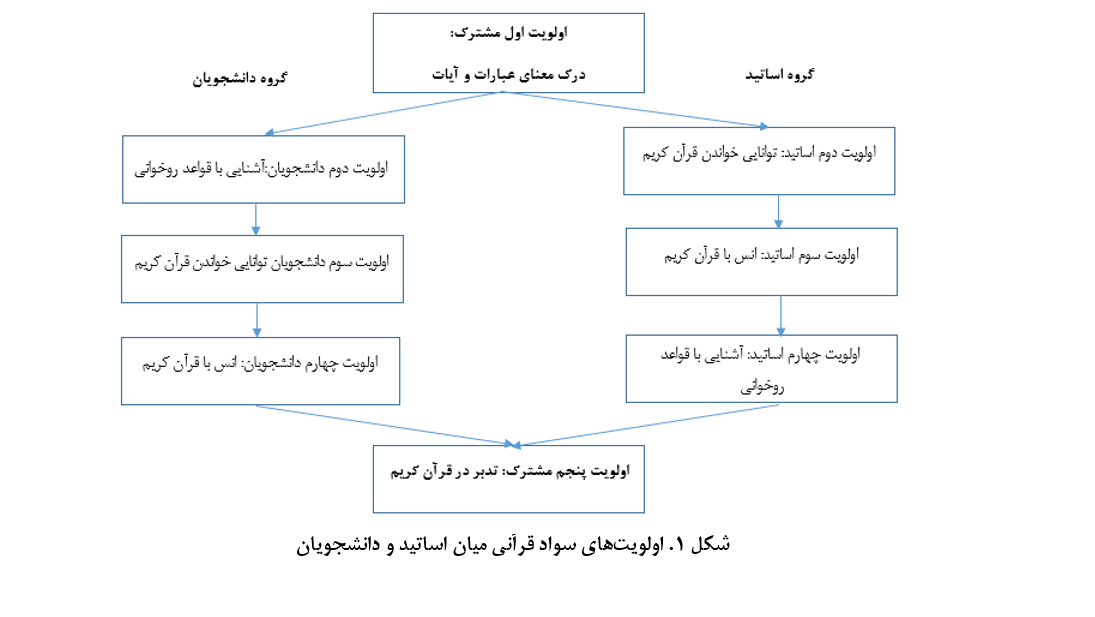A Reexamination of the Components of Quranic Literacy and Their Prioritization to Enhance Quran Education in a University Setting Based on E-Learning
Keywords:
Familiarity with the rules of reciting, the ability to read the Holy Quran, understand the meaning of the phrases and verses, familiarity with the Holy Quran and deliberation in the Holy Quran, students, professorsAbstract
The aim of the present study is to examine the components of Quranic literacy (familiarity with recitation rules, ability to read the Quran, understanding the meanings of phrases and verses, engagement with the Quran, and contemplation of the Quran) and their prioritization for lifelong learning planning for students and faculty members at Payame Noor University. This study is applied in terms of its goal, causal-comparative in nature, and conducted in a survey format. The statistical population consists of all faculty members from the Department of Educational Sciences at Payame Noor University and e-learning students at the university for the 2023-2024 academic year, with a stratified random sample of 358 students and 84 faculty members selected. Following a literature review, a researcher-made questionnaire assessing Quranic literacy, which had confirmed validity and reliability, was distributed among the sample. The results of the independent t-test indicated a significant difference between students and faculty members concerning the components of understanding the meanings of phrases and verses, engagement with the Quran, and contemplation of the Quran. However, no significant difference was found between students and faculty members regarding familiarity with recitation rules and the ability to read the Quran. Additionally, the results of the Friedman test for ranking the Quranic literacy components showed that both groups, students and faculty members, jointly prioritized understanding the meanings of phrases and verses as their top choice. Faculty members then ranked the ability to read the Quran, engagement with the Quran, and familiarity with recitation rules in subsequent order, while students followed the same sequence. Both groups commonly chose contemplation of the Quran as their lowest priority. Given the importance of education in fostering Quranic literacy, specialized Quran education courses should be designed as part of a comprehensive curriculum focusing on Quranic literacy components for both students and faculty members.
Downloads
References
Rigi H, editor The necessity of teaching the Holy Quran in elementary schools of the Islamic Republic2023; Bandar
Abbas.
Nurhalizah S, Siahaan A, Daulai AF. Implementation of the Al-Qur'an Literacy Program to Improve the Ability to
Read the Al-Qur'an at the Al-Abid Islamic Elementary School in Medan. International Journal Of Humanities Education And
Social Sciences (IJHESS). 2023;3(2):975-88. doi: 10.55227/ijhess.v3i2.612.
Maisarah M, Wijaya C, Daulai AF. The Influence of Internalizing Islamic Values and Quranic Literacy on Preventing
Bullying Behavior. EDUTEC : Journal of Education And Technology. 2023;7(2):472-81. doi: 10.29062/edu.v7i2.669.
Ghorbanian M. Examination and explanation of the methods of the Holy Quran in transforming human culture and
beliefs. Quran, Culture, and Civilization. 2022;3(1):28-47.
Nazari M, Ghabari Bonab B, Bahrinan SA, Haji Alizadeh K. Designing and examining the psychometric properties
of the Spiritual Maladaptive Schemas Questionnaire. Disability Studies. 2022;12(147):2-8.
Norouzi F, Payan K, editors. How could I improve Quran reading and fluency skills in students by using various
teaching methods?2023; Mazandaran, Mahmoudabad.
Ajam AA, Mobasheri Z. The effectiveness of "Quranic Stories" on the "philosophical mindset" and "tendency toward
critical thinking" of sixth-grade female students. Biannual Scientific-Research Journal of Psychology. 2019;13(25):51-68.
Jalali SM. Structural pathology of modern science with an approach to religious science. Shiite Comparative Theology
Research Journal. 2024;5(8):133-72.
Saif Aziz M, Arsyad J. The Effectiveness of The al-Qur'an Literacy Program In Improving Academic Achievement.
Jurnal At-Tarbiyat :Jurnal Pendidikan Islam. 2024;7(3). doi: 10.37758/jat.v7i3.445.
Aziz H, Hikmawati M, editors. Al-QUR'AN LITERACY: CONCEPTIONS OF METAPHORICAL THINKING IN
THE HOLY QURAN2024.
Bukhari Muslim A, Harisca R, Basyori A, editors. The Impact of Arabic Literacy on Understanding Quranic
Verses2024.
Supriadi U, Supriyadi T, Abdussalam A. Al-Qur'an Literacy: A Strategy and Learning Steps in Improving Al-Qur'an
Reading Skills through Action Research. International Journal of Learning, Teaching and Educational Research.
;21(1):323-39. doi: 10.26803/ijlter.21.1.18.
Hatika H, Abu Nawas MZ, Takwim M, Riawarda A. Implementation of Al-Qur'an Literacy for High School Students.
Journal of Indonesian Islamic Studies. 2021;1(1):1-8. doi: 10.24256/jiis.v1i1.2267.
Rafiei M, Sharifi M. The status of Quranic literacy among students (Case Study: Student-teachers at Farhangian
University). Biannual Journal of Quran Recitation Studies. 2023;11(21).
Allah Karami A, Amiri A, Tufani Nejad E. Interactive multimedia, Quranic literacy, and academic motivation.
Educational Technology and Learning. 2017;3(12):27-46.
Hosein Bar Modarres MA, Sepahian A, editors. The place of Quranic literacy of students in the Fundamental
Transformation Document and the National Curriculum2013.
Sohrabi H, Mohammadrezaei A, Emadi M. The effectiveness of the national Quran memorization plan in enhancing
Quranic literacy among NAJA employees. Insight and Islamic Education. 2016;13(39):133-56.

Downloads
Published
Submitted
Revised
Accepted
Issue
Section
License
Copyright (c) 2024 Journal of Study and Innovation in Education and Development

This work is licensed under a Creative Commons Attribution-NonCommercial 4.0 International License.










